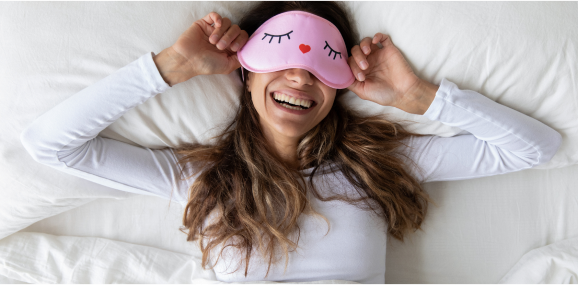When you don’t get enough sleep, you probably feel it. You carry it around with you all day. You’ll feel groggy and lethargic. You might drink coffee like your life depends on it. Your body and mind are saying “you owe me a few more hours,” and they won’t relent until they get the sleep they’re asking for.
If this happens to you, you’re probably dealing with sleep debt. It’s important to listen to your body and meet its needs. Here’s what you should know about sleep debt, including how to resolve the issue when it happens and avoid it in the future.
What Is Sleep Debt?
Sleep debt occurs when you don’t get the proper amount of sleep. The correct amount of sleep will vary from person to person, but the current recommendation is that most healthy adults should be getting between 7 and 9 hours of sleep every night.
Everyone will technically have a sleep debt of at least 1 hour if they only sleep for 6 hours. Some people may sleep for 8 hours and still have a sleep debt of 1 hour if their body needs 9 hours of sleep.
Is Sleep Debt Real?
Sleep debt is real, but often misunderstood. You aren't necessarily fixing your sleep debt if you slept poorly all week and decided to sleep for 10 hours on Saturday night. Sleep is an immediate need for your body that can’t be pushed into the future. The sleep you get five days from now won’t make up for the sleep you need today.
How Does Sleep Debt Affect People?
Simply put, sleep debt is the same thing as feeling tired all day. When you don’t get a lot of sleep, your body doesn’t have enough time to convert short-term memory to long-term memory, repair muscle and tissue, and let the immune system basically run maintenance.
Your body is busy working on maintenance tasks when you sleep, and it can’t afford to go without that maintenance period.
When you don’t sleep enough, you’ll feel lethargic and “run down” the following day. It’s clear that your body and mind are telling you to go back to bed.
If you regularly don’t get enough sleep, your body will begin to suffer. It’s normal to experience body aches, a diminished immune system, low mood, poor concentration, and slow memory recall if you’re frequently missing sleep.
Can You Catch Up on Sleep?
You can catch up on sleep, but you need to do it within a short window of missing that sleep. If you only sleep for 5 hours on Monday night, you can’t make up for that sleep debt on Thursday. You need to make up for it on Tuesday in order to set your body back on track.
How To Deal With Short Term Sleep Debt
If you wake up feeling the effects of sleep debt and you know you didn’t get the 7 to 9 hours of sleep that you needed, you need to plan to eliminate your sleep debt as soon as possible. You can’t push the issue into the future. Your body needs to meet its requirement for sleep.
Go Back to Sleep if You Can
If you wake up and realize you didn’t sleep enough, go back to sleep if that’s an option. If you won’t be late to work, school, a commitment, or an appointment, give yourself a little more time.
If your plans for the morning were flexible in nature, like grocery shopping or mowing the lawn, put them off until later. It won’t make a difference if you get to the grocery store two hours later than you’d planned.
Don’t Run for Caffeine
When many of us are tired, we run for caffeine. There’s nothing wrong with having a cup of coffee in the morning if you enjoy it as a part of your daily ritual. What you shouldn’t do is use caffeine as a substitute for sleep.
As tempting as it may be to run for caffeine when you begin to feel weighed down by the fatigue of sleep debt, you should avoid doing so. Your plan should be to fulfill your sleep debt by getting more sleep. Stimulants like caffeine can give you temporary energy that will make it difficult for you to get back to sleep (or take a nap) when you have the opportunity to doze off. You can still feel the effects of caffeine up to 6 hours after you’ve had that cup of coffee.
Instead of relying on caffeine, eat a balanced meal of healthy whole foods like lean proteins and healthy fats. This will help your body create subtle natural energy that won’t have lingering effects (or cause an afternoon crash) like caffeine might.
Take a Power Nap
Naps can help to restore mental alertness and ease the symptoms of sleep debt when used appropriately. Although it might seem like a long nap is a wise idea to restore lost sleep, it’s more likely to skew your schedule.
If your nap is several hours long, it may distort your sleep schedule. You might also wake up feeling groggy and slow as a result of disrupting your sleep schedule.
If you keep your naps short, confining them to 30 minutes or less, you’re more likely to wake up refreshed and energized. In 30 minutes, your body and mind can get a little boost from visiting the lighter stages of sleep.
Plan To Get Sufficient Sleep
If you know you didn’t get enough sleep last night, your plan should be to get to bed early tonight. Aim for a bedtime that will allow for a full 9 hours of sleep before your waketime rolls around. This will give your body enough time to rest and recharge. When you wake up, you should feel much better than you did when you went to sleep.
How To Avoid Sleep Debt
It’s better to avoid sleep debt than it is to handle it when it happens. You need consistent, high-quality sleep for your overall health. Sleep, like anything else you do for your health and wellness, needs to be a priority in your life. You should structure your day with sufficient sleep in mind.
Keep Your Mornings Energetic and Your Nights Laid Back
If you drink caffeinated beverages, limit them to the morning hours. The effects of caffeine can linger for hours. The sustained stimulation effects can make it difficult for you to get some sleep at night. Stop caffeine before lunchtime to avoid the lingering effects from disrupting your nighttime routine.
Exercise is vital for your overall health. While it requires you to use energy, it doesn’t wear you out. Exercise can make your body more efficient at using energy stored in the form of body fat. If you exercise in the evening, your body will experience an influx of natural energy.
It’s a better idea to get your workout at the beginning of the day. The natural energizing effects of exercise can help to sustain you, and your energy levels will naturally dwindle as the sun sets. If you do prefer to exercise at night, light stretching or mindfulness yoga can help you switch gears into a relaxed state without the energizing effects of intense cardiovascular exercise.
Be Firm About Your Bedtime
Seven to nine hours is a substantial part of your day, and you need a long stretch of uninterrupted time. The best way to ensure you get enough sleep is to set a bedtime that reflects your desired wake time.
Your bedtime should be the time you’re actually in bed and ready to go to sleep, not the time you start getting ready for bed or do your nighttime reading. If it helps, set an alarm for 30 minutes before your bedtime to help you stay on track. That alarm will give you a reminder to wrap things up and finish getting ready for bed.
Get Rid of Bedtime Distractions
Once you’re in bed, your ultimate goal is to fall asleep. You need to get rid of any distractions that may sway your attention. Your phone is usually the biggest culprit in this scenario. Your phone has the potential to throw off the momentum of your entire night. When you start scrolling, you lose track of time.
Your phone (as well as your TV and your computer) also emit blue light. Your brain perceives blue light similar to the way it perceives sunlight. Your circadian rhythm acts as your natural process of sleep-wake signaling, and it depends on light cues to release certain hormones and begin certain processes.
When your brain receives blue light, its signals and messaging become skewed. It doesn’t begin the process of getting ready for sleep because it thinks its daytime.
When blue light delays the natural release of sleep hormones like melatonin, you’re not likely to get to sleep when you want to. Putting away all electronics about an hour or more before bed can help. If you want to spend some time winding down before you go to sleep, reading a book with a yellow reading light, meditating, or doing a little pre-bed yoga won’t disrupt your circadian rhythm.
Set Yourself Up for All-Night Comfort
In order to fully receive the benefits of sleep, you need to stay asleep throughout the night. Interrupted sleep can leave you feeling exhausted the next morning, particularly if the interruptions are frequent.
Many people react to temperature fluctuations throughout the night. If you get hot and wake up to toss the covers off, that’s a sign that you need to keep your room cooler when you sleep. The recommended temperature for sleep is between 60 and 67 degrees Fahrenheit. A fan won’t cut it. Fans don’t actually make the room cooler — they simply circulate the air. Dialing down your thermostat is the only solution.
Choose bedding that feels good against your skin and provides the right level of warmth. It’s a bad idea to use a heavy quilt in the summer or to use a thin throw in the winter. Your bedding should always be appropriate for the weather. It’s worth splurging on high quality bedding that won’t feel scratchy or stuffy, since it’s going to be in contact with your skin all night.
Tuck Yourself in With a Hug
Many people find the sensation of swaddling to be calming. They feel secure when they’re tightly tucked in. The Hug Sleep Pod is made to allow you to tuck yourself in. You cuddle up into the pod, and the four way stretch provides gentle compression to your whole body. The fabric is breathable and soft, so it won’t feel hot or itchy inside.
Hug can keep you tucked in from dusk until dawn. If it helps you get better sleep, you’re more likely to wake up feeling refreshed, recharged, and ready to take on the day.
Sources:
7 amazing things that happen to your body while you sleep | Queensland Health
Caffeine & Sleep: How Long Does Caffeine Last & Keep You Awake? | Houston Methodist On Health
The inner clock—Blue light sets the human rhythm - PMC | National Institutes of Health


































500,000+ happy customers